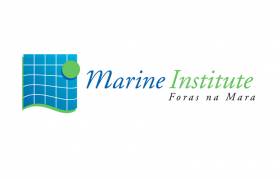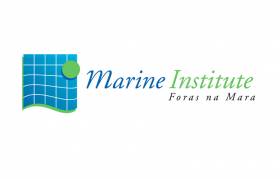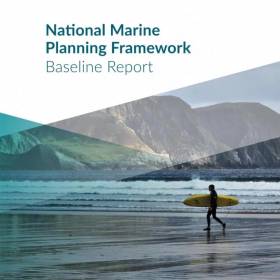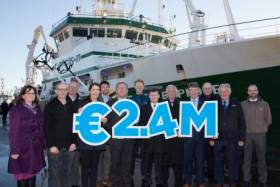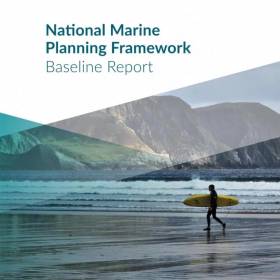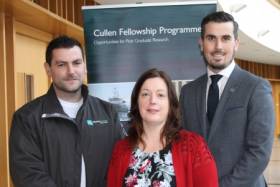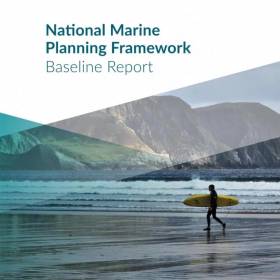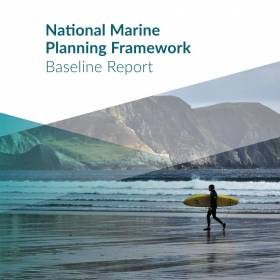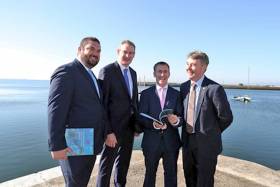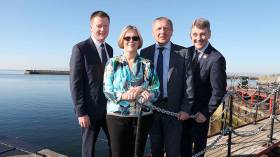Displaying items by tag: Our Ocean Wealth
Seven renewable energy projects are benefitting from a significant funding injection following investment by the Marine Institute’s industry-led awards, as reported last month on Afloat.ie.
With the aim of driving innovation in the marine sector and accelerating renewable energy breakthroughs, funding of up to €200,000 was awarded to each of the research projects to be conducted by indigenous companies, with some including university partners.
Speaking at the funding announcement, Marine Institute chief executive Dr Peter Heffernan said: “The diversity of renewable energy projects benefiting from this funding demonstrates the innovation and expertise that we are developing in Ireland in this sector.
“From research on the impact of floating platform technology to subsea micro-piling to hybrid solar and wind energy devices, the commercial opportunities of these projects are very exciting. We are committed to supporting marine enterprises in Ireland to drive Ireland's blue economy.”
Gavin & Doherty GeoSolutions is being awarded €199,957 over two years for their research project in partnership with University College Cork that will involve a geological, geotechnical, sediment and morphodynamic assessment of designated areas of the Irish seabed.
Predictive sediment transport modelling, validated against field data, will be used to characterise future seabed changes and to quantify the risk for future potential offshore wind developments in the Irish sea.
The outcomes of the project will support developers in efficient design, installation and maintenance planning of offshore renewable assets and will reduce the risk associated with future wind farm developments in the Irish Sea.
Two projects in the area of floating energy platforms were also successful in their research funding applications.
Solar Marine Energy will receive €195,465 over two years, in partnership with UCC, to progress how solar energy can be harnessed on a floating platform to power an electrolysis unit to produce Hydrogen in an electro-fuel form while using battery storage for the release of power as and when required.
Solar Marine Energy Ltd (SME) is one of the first companies to design, engineer and manufacture cost-competitive floating solar energy products in its Floating Solar Panels, in accordance with maritime industry best practice.
To make floating wind a commercial reality, further technology innovation is necessary. The Eureka-Sea Wind project proposed by Marine Materials Ireland Ltd (MMI) will also receive €199,816 over two years to develop reliable and efficient floating wind turbine technology based on a novel concept that reduces cost and weight.
Based in Ireland and the USA, Resolute Marine Ltd has developed a successful Oscillating Wave Surge Converter (OWSC) flap system.
Now with a funding boost of €199,955, Resolute Marine will bring the OWSC from concept to robust design that is optimised for locations in the developing countries and islands targeted for commercial installations of RML’s innovative wave-powered desalination systems.
This project is set to advance the Irish wave energy industry and provide jobs for three additional highly trained experts in the fields of hydrodynamics, ocean engineering and project management.
Subsea Micropiles is being awarded €199,902 for research on the design and temporary installation of two demonstration micropile anchors.
The anchor frames will represent structures that would support the foundations of offshore wind turbines or hydrokinetic energy converters. The two anchors will be load tested both horizontally and vertically and the results compared with design predictions.
This type of micropiling technology for subsea environment provides a real and cost-effective alternative to current subsea micropiling models.
Use of robotically installed micropiles in the subsea environment represents important innovation and potential cost saving for marine renewable energy projects.
Fish farmers are actively searching for renewable energy sources to replace the diesel consumption, which causes concerns in relation to emissions and increases risk of oil spills when transporting diesel to the feed aquaculture barges.
Wind and solar generation on fish farm cages currently do not meet the power needs and can be fundamentally challenging and particularly high maintenance, when mounted so close to the ocean itself.
Wave energy, especially when coupled with the existing mooring system, is seen as a very appealing solution.
Exceedence and TfI Marine secured €199,532 in funding to research and develop a revolutionary 1kW Inline Gator system. The Inline Gator will harness the natural power of the waves by converting the motion of the fish cage into electricity thereby mitigating the need for fossil fuels.
W1DA Experience Ltd is also being awarded €198,763 in funding for the Marine EcoPowa Project in partnership with the University of Southampton and UCC.
The project aims to create a new generation of medium power (12-15KW/20-30HP) environmentally–friendly marine propulsion and energy regeneration systems that will replace what is currently termed as “outboard motors”.
The potential financial benefits to boat users in Ireland are significant, potentially costing less than half that of petrol and diesel motors over a 10-year lifetime.
The Marine Institute says it is committed to assisting industry-led development through knowledge transfer, capacity building and research to enable optimal decision making and planning to best leverage Ireland’s natural marine resources sustainably and efficiently.
This investment in marine enterprises is a key output of the Marine Institute Strategic Plan 2018-2022: Building Ocean Knowledge, Delivering Ocean Services, guided by the Government’s integrated marine plan Harnessing Our Ocean Wealth as well as the National Marine Research and Innovation Strategy 2017–2021.
Increased economic growth and job creation from small and medium-sized enterprises based in Ireland is a key component of several national strategies and regional development plans. Funding for these seven renewable research projects is being provided by the Marine Institute and the Government, co-funded under the European Regional Development Fund (ERDF).
Robotics, Internet of Things and data analytics are set to play a key role in Ireland's blue economy, according to the Marine Institute.
The national funding agency for the marine research industry recently awarded financial investments in two marine technology projects led by Xocean and IDS Monitoring.
Louth-based marine technology firm Xocean has been awarded €199,739 in funding over two years to transform marine monitoring and data collection.
The company uses innovative robotics, particularly unmanned vehicles, and IoT technology to monitor and collect data at sea.
Elsewhere, a new smart data buoy project by Clare-based IDS Monitoring will also benefit from a €196,955 funding grant, to develop a new smart buoy for coastal and inshore environmental monitoring.
The new IDS Buoy will make it easier to assemble, deploy and use buoys, as well as reducing purchase costs and maintenance, whilst enhancing the value of the information delivered through the smart buoy.
Recently announced by the Department of Agriculture, Food and Marine, the industry-led awards support Ireland's Integrated Marine Plan, Harnessing Our Ocean Wealth, as well as the national Marine Research and Innovation Strategy 2017-2021.
“Supporting Irish companies in the marine sector, through research grants, helps to accelerate innovation and drive growth in our blue economy,” said Marine Institute chief executive Dr Peter Heffernan.
“The Marine Institute is committed to assisting industry-led development through knowledge transfer, capacity building and research to enable optimal decision making and planning to best leverage our natural marine resources sustainably and efficiently.
“Both advanced technology research projects funded through the Marine Institute have the potential to be globally significant, and present enormous commercial opportunities for these Irish marine enterprises.
“Increased economic growth and job creation from small and medium sized enterprises based in Ireland is a key component of several national strategies and regional development plans.
“These awards will be carried out with the support of the Marine Institute under the Marine Research Programme 2014-2020 funded by the Irish Government, co-financed by the European Regional Development Fund.”
Marine Environment Raised By More Than Half Of Submissions On New Planning Framework
More than half of submissions (53%) in the public consultation on the National Marine Planning Framework Baseline Report concerned the marine environment.
Ports and shipping (44%), climate change (42%) and nature conservation (41%) were other important topics raised among the 173 submissions received by the Department of Housing, Planning and Local Government from a wide range of stakeholders.
Published late last year, the baseline report aimed to bring together a clear picture of all activity in Ireland’s seas for the first time.
As previously reported on Afloat.ie, representatives from all key sectors comprise an advisory group overseeing the process.
In its preliminary analysis of responses, the department also identified renewable energy, aquaculture and fisheries, seaweed harvesting, cultural heritage and assets, and consents and licensing as other areas of importance to a cohort of stakeholders that runs from public sector bodies to local authorities, coastal community groups and sports bodies.
One of the key questions asked of respondents regarded Ireland’s future approach to spatial designation marine planning, with the vast majority of the 57 who expressed a preference opting for either a policy-led plan (44%) or a hybrid of policy and zoning (40%).
The proposal for a National Marine Planning Framework has been broadly welcomed by respondents, with the Irish Marine Federation (IMF) describing it as “the most significant shift in Irish marine policy for several decades” while adding that the economic contribution of sport and recreational boating, including marine tourism, has thus far been largely underestimated, and related policy should be fully integrated in any plan.
The IMF also raised the question of spatial planning in relation to Brexit, with lack of resolution of boundary issues over the likes of Lough Foyle and Carlingford Lough “a matter of great concern”.
All responses to the public consultation have been collected HERE.
Minister Announces €2.4m Investment By Marine Institute In Industry-Led Marine Projects
Marine Minister Michael Creed TD has announced that the Marine Institute is to provide 12 marine businesses (in collaboration with five universities) with investment funding totaling €2.4 million over three years.
Read the full allocation of the grant recipients here
The funding is being provided to drive continued innovation in Ireland;s ocean economy, a key requirement of the Marine Institute-led National Marine Research and Innovation Strategy 2017-2021.
The 12 grants of up to €200,000 each, which are being provided to individual companies and company-led consortia, will support novel R&D and the development of new technologies in key growth areas such as marine engineering, renewable energy and the blue bioeconomy.
Minister Creed said: “Ireland’s blue economy continues to grow and develop in line with the targets of the national integrated marine plan, Harnessing Our Ocean Wealth.
“Indigenous small and medium enterprises are identifying new commercial opportunities across a range of marine sectors which can lead to economic growth and new jobs. These industry-led awards provide the opportunity for companies to build their R&D capacity and to innovate towards new products and processes.
“I look forward to seeing the 12 successful companies develop and grow their businesses with the support of this significant public investment funding.”
Marine Institute chief executive Dr Peter Heffernan added: “The Marine Institute is committed to assisting industry-led development through knowledge transfer, capacity building, research and innovation. This investment in industry-led research is a key deliverable of the Marine Institute Strategic Plan 2018-2022: Building Ocean Knowledge, Delivering Ocean Services.
“Job creation in the marine sector is increasing as a result of such investment and Irish marine companies have built an excellent reputation internationally for innovation and best practice. The 12 companies receiving funding through this funding call have demonstrated the demand and capability to fuel further growth through marine research.”
Increased economic growth and job creation from small and medium-sized enterprises based in Ireland is a key component of several national strategies and regional development plans. These awards will be carried out with the support of the Marine Institute under the Marine Research Programme 2014-2020 funded by the Government, co-financed by the European Regional Development Fund (ERDF).
A diverse range of companies applied to the Marine Institute, following the launch of its industry-led call in May 2018.
Awards have been approved for companies operating in a range of marine sectors including companies such as SolarMarine Energy (€195,465 for a floating solar hybrid energy project), Gavin & Doherty Geosolutions (€199,957 for a morphodynamic study of the Irish Sea), Subsea Micropiles (€199,902 for development of micropile technology in subsea environments), Marine Materials Ltd (€199,816 for its Eureka-SeaWind offshore wind energy project), Exceedence Ltd (€199,532 for its inline gator for aquaculture), w1Da Experience (€198,763 for its marine EcoPowa project) and Resolute Marine (€199,955 for its oscillating wave surge converter design).
Bioresources processing company Bio-marine Ingredients Ltd, was awarded €200,000 for the development of marine functional food to support healthy ageing in older adults, while advanced technologies companies Xocean Ltd (€199,739 for fisheries surveys using ‘swarms’ of unmanned vessels) and IDS Monitoring (€196,275 for its ‘smart buoy’ project), and marine engineering companies Technology from Ideas (€199,960 for the Aquamoor sustainable mooring for shellfish and seaweed) and Ocean Energy (€195,565 for engineering advanced material for marine energy and aquaculture) were also successful in their funding applications.
A Public, Policy-Led Plan With Climate Change Focus: What Ireland Wants From New Marine Spatial Plan
A policy-based plan that puts climate change front and centre and steers away from privatising coastal resources is what the country wants from the State’s National Marine Planning Framework, as The Irish Times reports.
Details have been released from the recently concluded consultation on the framework’s baseline report, released in September and branded as “a key part of the process of developing Ireland’s first marine spatial plan”.
The majority of responses (53%) were related to the marine environment, with 42% of submissions raising the prospect of the plan including measures to deal with climate change.
That news is timely with fears that coastal erosion poses a threat to hundreds of communities around Ireland.
Respondents also expressed preference for a policy-driven approach over specific zoning or a hybrid of the two, and many were adamant that the plan must retain Ireland’s marine resources in public hands.
The Irish Times has much more on the story HERE.
Importance Of ‘Blue Economy’ Skills Highlighted At Cullen Fellowship Meeting
Nineteen postgraduates presented their marine research highlighting the innovation and contributions being made towards the growth of the marine sector in Ireland at the Cullen Fellowship Programme’s two-day annual meeting last week.
Dr Peter Heffernan, chief executive of the Marine Institute which hosted the meeting in Oranmore, had particular praise for Philip Stephens of NUI Galway and James Fahy of University College Dublin, who recently completed their respective Master’s degrees in Science.
“The graduates and other Fellows’ high level of accomplishments are welcomed in Ireland, particularly when the ocean sector is one of the fastest areas of economic growth, outpacing progress in the general economy in recent years,” Dr Heffernan said.
The Cullen Fellowship Programme has provided grant aid to the value of €1.9 million supporting 24 PhD and three Master’s students in their research over the last four years.
This has involved 15 research themes identified in the National Marine Research & Innovation Strategy 2017-2021, ranging from marine technology and fisheries management to oceanographic research, aquaculture, fish health, food safety, seabed mapping, marine technology, shipping and maritime transport, marine environment, marine economics, law and policy, education and outreach.
“We are extremely pleased with the high calibre of skilled marine researchers that have been involved with the Cullen Fellowship in recent years,” said Martina Maloney of the Marine Institute’s research funding office.
“The opportunities that the students have gained has helped further support the Government’s national Harnessing Our Ocean Wealth strategy in developing a thriving maritime economy, building healthy marine ecosystems and creating engagement with the sea.”
The growth of Ireland’s ocean economy in 2017 had a direct impact of €5.5bn turnover employing over 32,000 people. The Government investment in the ocean economy is on track to double the value of Our Ocean Wealth to 2.4% of GDP by 2030.
“We are reliant on the ocean for its food through fisheries and aquaculture, ocean transport involving shipping and tourism as well as the societal impact the ocean provides us,” Dr Heffernan said.
“Therefore, with the trend in changing economies, new forms of energy, transport and food production transforming industries, companies and jobs in the near future, it is important that we continue to invest in third level research for our next generation of marine scientists and researchers.”
The Marine Institute set up the Cullen Fellowship programme in 2014 in memory of Anne Cullen (1958-2013), who had made a significant contribution to the work of the Marine Institute over 35 years, inspiring many students through the Institute's bursary programme, encouraging students to get hands-on experience to support their study.
The Cullen Fellowships are carried out with the support of the Marine Institute and funded under the Marine Research Programme by the Government.
Cullen Fellowship opportunities will be advertised as they arise on www.marine.ie under ‘Research and Funding – Current Funding Opportunities’ and through various social media channels.
Galway Hosts Public Meeting On Marine Planning Framework
Sean Kyne, Minister of State with responsibility for rural affairs and natural resources, was speaking this morning (Friday 5 October) in Galway’s Town Hall Theatre, as Galway Bay FM reports.
The minister was attending one of a series of regional events for the public on the National Marine Planning Framework Baseline Report.
As previously reported on Afloat.ie, the recently published report sets out the context in which the marine equivalent of the National Planning Framework is being developed.
The public consultation will remain open till Friday 14 December.
According to the Connacht Tribune, activist group Galway Bay Against Salmon Cages was scheduled to hold a silent demonstration outside the theatre.
The group protests the inclusion of salmon farming multinational Marine Harvest on the framework’s stakeholder consultation panel.
Public Invited To Have Their Say On National Marine Planning Framework Report
#OurOceanWealth - A new report aims to brings together a clear picture of all activity in Ireland’s seas for the first time.
Published yesterday (Tuesday 18 September), the National Marine Planning Framework Baseline Report has been branded “a key part of the process of developing Ireland’s first marine spatial plan”, which is intended to be the marine equivalent of the National Planning Framework.
The report sets out the context in which the marine plan is being developed in order to identify the key issues to address via consultation or discussion with various stakeholders, whose responses will inform the first draft framework to be published in mid 2019.
Representatives from all key sectors — fisheries, aquaculture, energy, tourism, sport, local authorities and environmental NGOs — comprise an advisory group overseeing the process.
Speaking on the Baseline Report, Damien English, Minister of State at the Department of Housing, Planning and Local Government with responsibility for marine planning, said: “When we see the demands being placed on our marine area clearly laid out, we can effectively consider whether those demands can be met simultaneously or whether some management or governance is required in particular areas.
“As we move further along the process of plan-making, the report, and your feedback on it, will play a critical part in the examining of potential synergies and co-existences, facilitating conflict resolution, anticipating future spatial needs and balancing the ecological, economic and social elements of the marine in a sustainable fashion.”
Developed with assistance from the Marine Institute, the report is available online and the public are invited to make submissions on it until noon on Friday 14 December.
A series of regional panel events discussing the report will be held shortly in Waterford (Tuesday 2 October), Galway (Friday 5 October), Sligo (Friday 12 October), Cork (Friday 19 October) and Dublin (Tuesday 23 October).
#OurOceanWealth - New research from NUI Galway’s Socio-Economic Marine Research Unit (SEMRU) focuses on the ecosystem service benefits that society receives from Ireland’s marine environment.
The latest bi-annual report — Valuing Ireland’s Marine Ecosystem Services — was launched at the recent fifth annual Our Ocean Wealth Summit in Galway by Damien English, Minister of State for Housing and Urban Development, and Seán Kyne, Minister of State for Natural Resources, Community Affairs, and Digital Development.
Marine ecosystem services are provided by the processes, functions and structure of the marine environment that directly or indirectly contribute to societal welfare, health and economic activities. These services are vital to ensuring blue growth in Ireland’s ocean economy, which was valued at €1.8 billion or approximately 1% of gross domestic product (GDP) in 2017.
Factoring marine ecosystem service values into ocean economy account frameworks may help to ensure a sustainable ‘blue economy’ for Ireland by making sure that growth in the ocean economy does not exceed the carrying capacity of the marine environment.
While the value of some of these goods, such as fishing and aquaculture, are somewhat easier to measure, the value of many other benefits — such as carbon sequestration, waste assimilation and marine-related recreation — are often not captured by a price in any established markets.
However, without incorporating these values into marine planning processes, these benefits may be ignored or underestimated leading perhaps to suboptimal decision making.
Marine Institute chief executive Dr Peter Heffernan welcomed the new report, commenting: “This assessment of Ireland’s marine ecosystem services and their value is an important step in incorporating ecosystem services into policy and decision making related to Ireland's marine and coastal zones.”
SEMRU director Dr Stephen Hynes added: “Blue growth is about fostering development in marine economic activities in such a manner that the long term ability of the marine environment to continue to provide ecosystem service benefits is not compromised.
“This is exactly what Harnessing Our Ocean Wealth: An Integrated Marine Plan for Ireland is aimed at achieving. Knowing what those benefits are and what they are worth is vital for deciding on the best use of our marine resources and to ensure blue growth for our ocean economy far into the future.”
Commenting on the significance of the report, Dr Micheál Ó Cinnéide, director of the office of communications and corporate services at the Environmental Protection Agency (EPA), said it “adds greatly to our understanding of the value of our marine province. Anybody who was able to see the marvellous RTÉ documentary on Ireland’s Deep Atlantic in 2018 and who follows the pioneering work of researchers in the Marine Institute, Galway and Cork can appreciate that we are unlocking the treasures of our offshore world.
“As this report shows, the true value has to include the natural capital, economic potential, cultural and spiritual values. The EPA and the Irish Forum on Natural Capital looks forward to a wider national debate on safeguarding this priceless marine ecosystem for future generations.”
Valuing Ireland’s Marine Ecosystem Services is based upon research supported by the EPA and is based on previous research conducted under the Marine Institute’s Beaufort Award.
The full report is available to download from NUI Galway, with the technical version on the EPA website.
Summary of economic contribution of marine ecosystem services:
- The provisioning marine ecosystem services of fisheries and aquaculture is estimated to be worth €473 million per annum to all fleets and producers operating in Irish waters.
- Seaweed harvesting is valued at €4 million and aquaculture at €150 million.
- The regulating and maintenance ecosystem services of carbon sequestration are valued at €815 million per annum, waste assimilation services €317 million and coastal defence services of €11.5 million.
- The cultural ecosystem services of scientific and educational services are valued at €11.5 million, and the added value per annum to housing stock of being at the coast (aesthetic services) is valued at €68 million. On an annual basis, recreational services provided by the marine ecosystems are estimated to have an economic value of €1.7 billion.
- Even though not all of the ecosystem services provided by the marine environment can be monetarised, the report indicates that the value of those that can is substantial.
#OurOceanWeath - Employment growth of more than 16% in the marine sector was among the encouraging statistics cited by Marine Minister Michael Creed in his address to the Our Ocean Wealth Summit, which opened at Galway Docks yesterday (Thursday 28 June).
“Ireland has taken important strides in recent years in developing our blue economy. This is being driven at the highest levels of Government and represents a unique and joined up approach to growing Ireland’s blue economy.
“The work of our cross Departmental high level Marine Co-ordination Group (MCG), which I chair, will continue as we seek to build on recent success,” Minister Creed said.
Updated statistics indicate that the direct economic value of Ireland’s ocean economy now stands at €2 billion, or approximately 1% of GDP, which represents a 21% increase on 2015 figures.
“The 2017 estimates suggest that our ‘blue economy’ continues to grow at a faster pace than the general economy,” the minister added. “Growth in 2017 is being driven by strong performances in the aquaculture, sea fisheries, shipping and marine tourism industries as well as continued growth in the emerging ocean industries.
“A really encouraging statistic is the growth in employment for the marine sector which has risen from 27,888 (FTEs) in 2015 to an estimated 32,509 (FTEs) in 2017, an increase of 16.6%.”
Minister Creed also announced the publication of the latest annual Progress Report on Ireland’s Integrated Marine Plan - Harnessing Our Ocean Wealth.
“This report which covers inputs from across state departments and agencies, provides a wealth of information, spanning governance, research, education, international co-operation, business development, sustainability, and protection and conservation of marine ecosystems,” he said.
The Our Ocean Wealth Summit, now in its fifth year, forms a key part of the Government's integrated plan for Ireland’s marine sector and brings together national and international expert speakers, industry leaders, business development agencies and the Irish business and marine research community. This year’s discussions focused on the overall theme of ‘Investing in Marine Ireland’.
Ahead of the summit, PwC and the Marine Institute released the results of a joint survey of leading voices in Ireland’s maritime industry, which revealed “overwhelming confidence in Ireland’s maritime sector in spite of challenges posed by Brexit”.
Other findings include the potential of offshore wind and ocean energy, which is seen as a key opportunity for the marine sector, while overall, maritime leaders believe further investment in the marine industry is critical.
The Our Ocean Wealth Summit is part of a range of industry and innovation events taking place in Galway as part of SeaFest 2018, Ireland's national maritime festival, which opens today (Friday 29 June). A wide range of public events are taking place in Galway Harbour and Docks and the city over the weekend till Sunday 1 July.
Among them will be Life and the Sea, a special civic and military commemorative event to remember all those who have lost their lives at sea, and recognising the heroism of the men and women of our rescue services.
Mayor of Galway City, Niall McNelis, will address the special commemoration which will take place at 6pm on board the LÉ William Butler Yeats in Galway Harbour.
There will be musical performances, while poems will be read by Tony Hiney, community fundraising manager of the Western Region of the RNLI, and Lt Cdr David Fleming, Officer Commanding of the LÉ William Butler Yeats.
Minister of State Seán Kyne, accompanied by Mayor McNelis, and RNLI, Irish Coast Guard, Naval Service and Air Corps representatives will lay a wreath.
A lone piper will play, which will be followed by ship horns and a flyover by the Air Corps.



























